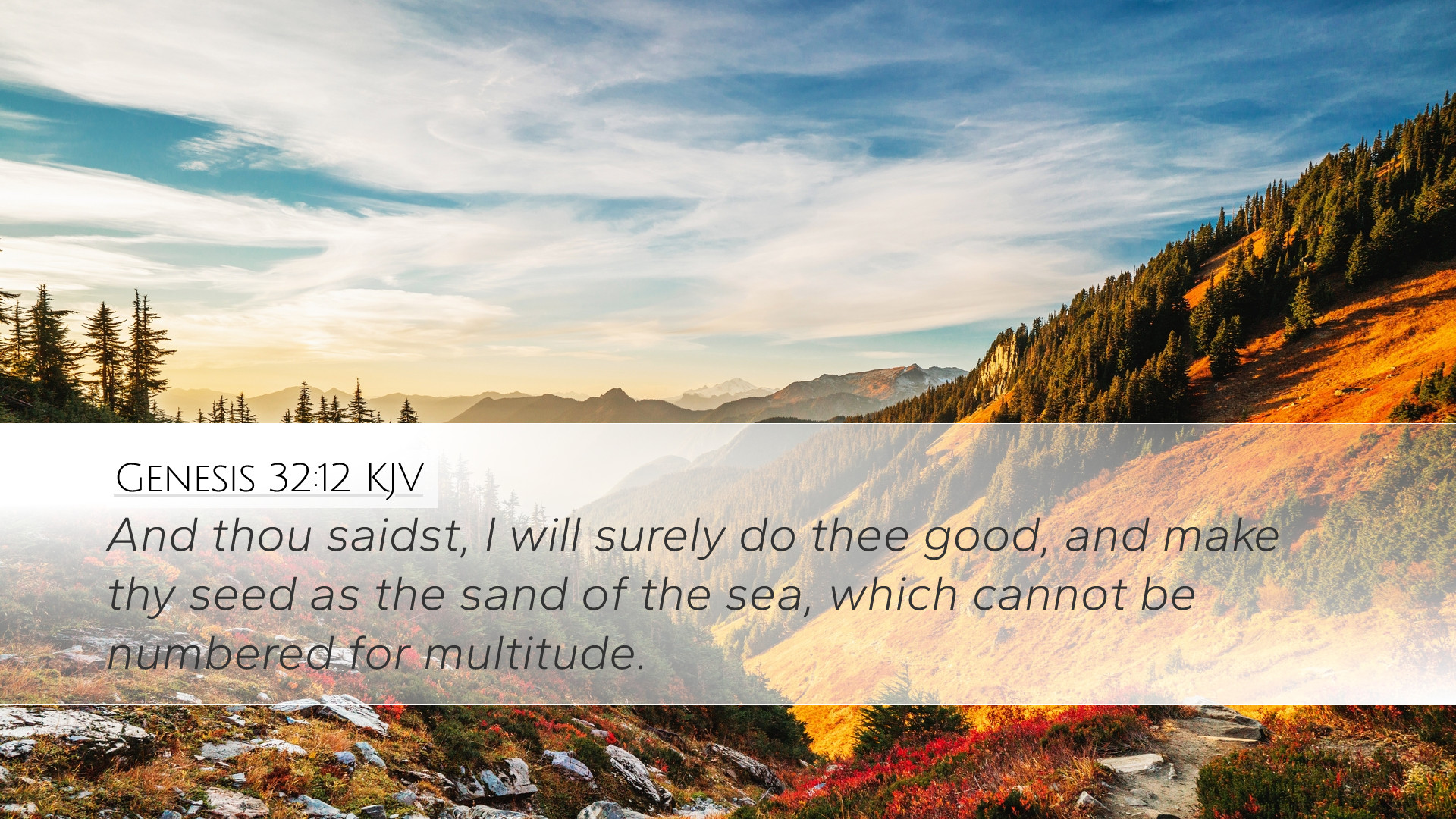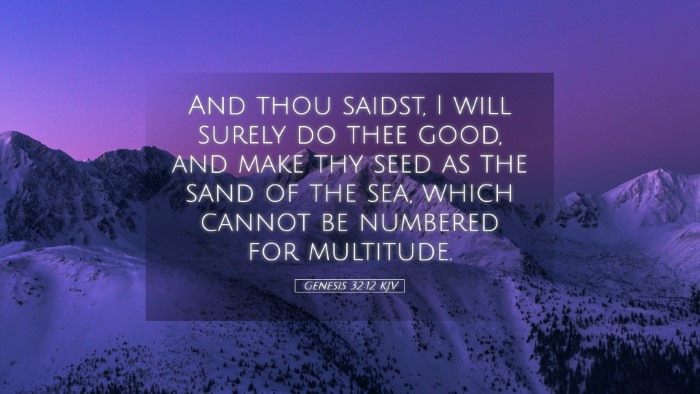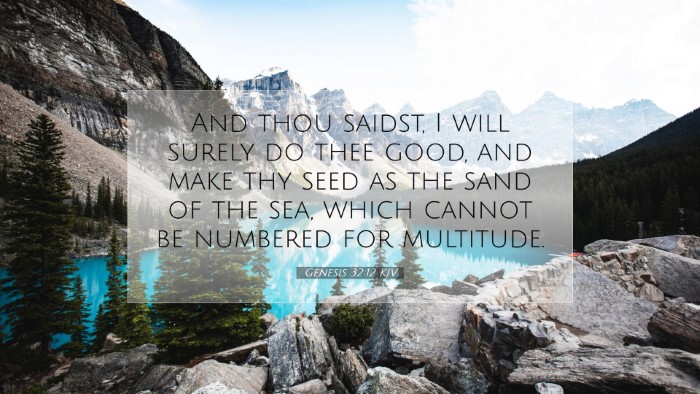Commentary on Genesis 32:12
Verse: Genesis 32:12 - "And thou saidst, I will surely do thee good, and make thy seed as the sand of the sea, which cannot be numbered for multitude."
Introduction
This verse captures a pivotal moment in Jacob’s life as he prepares to meet Esau after many years apart. It reflects themes of divine promise, the covenant with Abraham, and assurance amidst fear. The insights from public domain commentators offer profound understanding for pastors, theologians, and students of Scripture.
Context of Genesis 32
In the preceding chapters, Jacob’s journey from Haran back to Canaan is marked by significant struggles and divine encounters, including the dream at Bethel (Genesis 28) and wrestling with God (Genesis 32:24-30). He is now anxious about the meeting with Esau, fearing retribution for his past deceit.
Commentary Insights
Matthew Henry's Commentary
Matthew Henry emphasizes Jacob's reliance on God's promise as a source of hope. Jacob recalls God's assurance, "I will surely do thee good," which reinforces his faith. Henry notes that instead of focusing on his fears regarding Esau, Jacob primarily reflects on God's faithfulness to his covenant promises.
Promise as Assurance
- Henry elaborates that the phrase "I will surely do thee good" encapsulates God's unwavering commitment to Jacob. This promise serves as a reminder of God's past provisions and highlights the importance of trusting in divine fidelity, especially in tumultuous times.
- He highlights the contrast between God’s mercy toward Jacob and Jacob’s fear of Esau. This duality illustrates the complexities of human emotions when faced with potential conflict, revealing Jacob's spiritual turmoil intertwined with his reliance on God.
Albert Barnes' Commentary
Albert Barnes presents a detailed analysis of the various elements of this line, focusing on the implications of "making thy seed as the sand of the sea." He reflects on the vastness of God’s promise, indicating not only a numerical proliferation but also the qualitative greatness of Jacob’s descendants.
The Covenant Significance
- Barnes notes that this promise finds its roots in the covenant made with Abraham and reiterated to Isaac, now being passed on to Jacob. It emphasizes God's faithfulness across generations, establishing a legacy that impacts the future of the nation of Israel.
- The imagery of seeds and the sand highlights the notion of abundance and perpetuity. Just as the grains of sand are beyond counting, so are the blessings that God bestows on His people through faithfulness to His covenant.
Adam Clarke's Commentary
Adam Clarke's interpretation takes into consideration the personal and communal dimensions of God's promises. Clarke discusses the context in which Jacob finds himself and the interplay of fear and faith in his prayerful reflection.
The Nature of Prayer
- Clarke points out that Jacob’s acknowledgment of God’s promise serves as a template for prayer. He calls on God by reminding Him of His words, illustrating the power of invoking God's promises in prayer as an act of faith, which is essential for spiritual leaders.
- The nature of Jacob's plea is also noted, depicting a transition from self-reliance to total dependence on divine grace. Clarke highlights that the experience of wrestling with God not only prepares Jacob for the physical confrontation with Esau, but also an inner transformation that solidifies his identity in God.
Theological Reflections
This verse offers rich theological insights relevant for contemporary application:
- Faith in Divine Promises: The narrative underscores the importance of holding onto God’s promises during times of uncertainty. Pastors can emphasize the necessity of claiming God's assurances as a source of hope for congregants facing adversity.
- The Nature of God’s Faithfulness: Jacob’s experience illustrates that God’s covenant is not solely upon the worthiness of man, but rather a profound manifestation of divine grace and commitment. This serves as a powerful reminder that God's plans often unfold within the broader narrative of His redemptive work.
- Medium of Prayer: As Clarke suggests, using God’s promises in prayer can transform believers’ relationships with God, cultivating a deeper reliance on His sovereignty and goodness.
- Legacy of Faith: The mention of Jacob’s seed encourages discussion on generational faith. Pastors and leaders should reflect on how their adherence to God’s word can affect future generations, ensuring a rich heritage of faith.
Conclusion
Genesis 32:12 stands as a powerful reminder of God's covenantal faithfulness. It assures us that, amid our fears and challenges, we can rest in the promises of God. The collective insights from Henry, Barnes, and Clarke deepen our understanding of Scripture, encouraging believers to trust in the unfaltering goodness of God throughout all circumstances of life.


